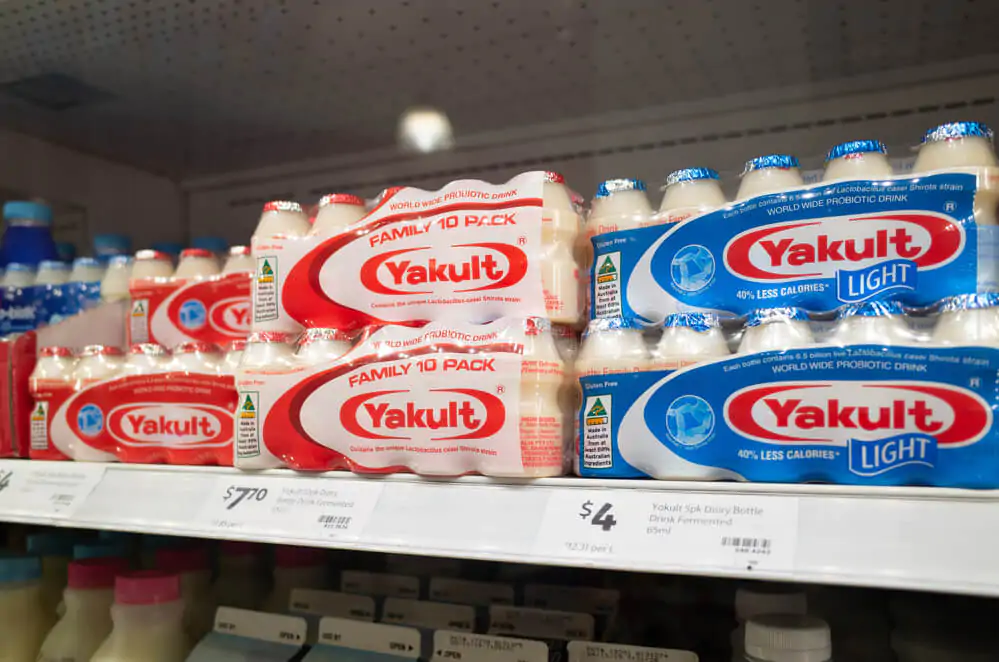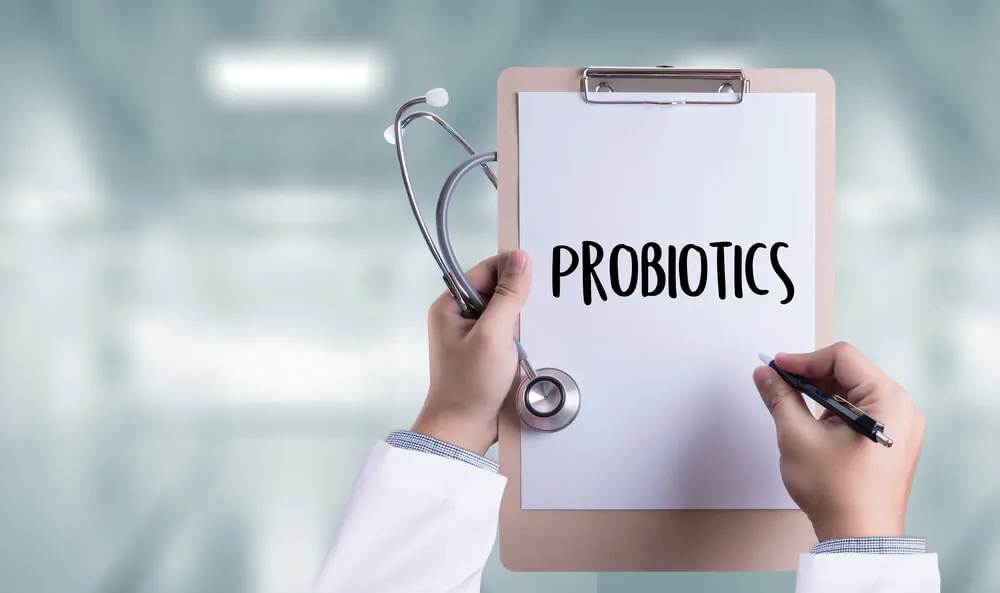Yakult is a probiotic drink, and the combination of probiotics and coffee are often a topic of debate. So, can you put Yakult in coffee? Let’s find out!

Due to the acidic nature of coffee, adding Yakult to coffee can essentially undo its health benefits. The same applies for warm drinks as heat kills bacteria. I would not recommend mixing your probiotics into a hot drink, as it will defeat the purpose.
Researchers from the National University of Singapore developed a new fermented coffee beverage with more than one billion live bacteria.
The research team developed this probiotic coffee product as an alternative to dairy-based probiotic products. Many people consume coffee daily, making it an ideal base for probiotics that require daily supplementation.
Probiotics and specific compounds in coffee can help stimulate bowel movement, but will the combination of probiotics and coffee upset your stomach or cause diarrhea? Starting a new probiotic routine may result in uncomfortable side effects, including gas or bloating.
Nevertheless, these side effects won’t last long – it is expected to clear up once your body adjusts to the probiotics.
Should I Drink Yakult Before Or After Drinking Coffee?
We recommend taking your probiotic drink first thing in the morning or before you go to sleep, as this is the time when your stomach acid levels are least acidic.
Probiotics are at their most effective when consumed on an empty stomach – this ensures that the beneficial bacteria can reach your gut as quickly as possible, without any food or coffee getting in the way.
For many people, drinking a cup of coffee is a daily ritual, but does it harm our daily dose of probiotics? With differing opinions everywhere, let’s try to clarify this by delving deeper into the matter.
Since coffee is warm and acidic, it kills most probiotic bacteria. I would not recommend mixing your probiotics with your hot drinks.
You should also drink Yakult or any other probiotic drink either one or two hours before or after your coffee.
If you don’t like coffee and prefer to start your day with tea, you may have heard that tea contains tannins, which can bind to minerals like iron and zinc and remove them from your body.
That’s why you should take these vitamins for at least half an hour before or after drinking your cup of tea. Nevertheless, this does not affect probiotics – the rules for drinking tea with probiotics are the same as for coffee.
If you’re not a fan of hot beverages, you can drink water or juice. However, remember that probiotics don’t like acid, so I wouldn’t recommend mixing them with fruit juice. Water or milk is the best for bacteria.
You might also be wondering can you put cream cheese in coffee.
How Does Coffee Affect Probiotics?

Coffee does not harm probiotic bacteria in general. However, if consumed immediately before or after drinking Yakult or any probiotic drink, hot coffee can kill probiotics. Many people don’t realize that it’s not coffee or caffeine that can harm probiotics – it’s hot beverages or hot water.
As mentioned earlier, researchers from the National University of Singapore recently published data about this probiotic coffee product with over one billion units of probiotics!
Probiotic bacteria work by lining the gut and colonizing there to kill the harmful bacteria – that’s how it improves our overall health.
Probiotics help to:
- Aid indigestion
- Boost the immune system
- Help the body produce vitamins such as biotin and vitamin B6
- Increase vitamins and minerals absorption
- Lessen cholesterol
- Protect your intestines
- Reduce cholesterol
- Reduce depression
- Reduce the growth of harmful bacteria
- Reduce the risk of cancer
- Regulate pH value
- Slow down the growth of yeast
Coffee contains acids, which can cause problems for some people, especially if left unchecked.
Drinking too much coffee can lead to:
- Adrenal gland burnout
- Catabolic muscle breakdown
- High cortisol levels
- Insulin resistance
- Nervous system stress
The recommended and healthy dosage of coffee is only three to four cups per day, around 400 mg of caffeine.
What Can Interfere With Probiotics?

Probiotics will not keep your digestive tract in good health on its own. Probiotics will work wonders with a balanced diet and a lifestyle change. So, there are some foods to be wary of if consuming probiotics.
You might also be interested in our explainer on can you put turmeric in coffee.
Processed Food
The packaged foods available can interact with your probiotics and digestive system. Potato chips, cake, and cookies are examples of processed foods high in preservatives and harmful ingredients.
So, what does processed food do? They can imbalance the good and bad bacteria in your gut and harm the beneficial bacteria. In addition, they usually contain no-fiber and have no nutritional benefits.
If you want a healthy diet, you should do is replace junk food with natural foods like vegetables and fruit.
Food containing Gluten
You may have noticed more people are gluten-free these days. For people who have coeliac disease, gluten is harmful. People acquire sensitivity to gluten-rich food’s components that cause an imbalance in the gut flora.
Red Meat
Red meat may also interfere with your probiotics and gut health. For example, choline is a red meat nutrient that produces bad gut bacteria. These compounds can harden the arteries, which can result in heart issues.
Even eating red meat twice or three times weekly can produce more harmful bacteria in your gut than healthy bacteria.
Carbonated Drinks
We know by now that most carbonated beverages are bad for you. It’s fine to have a can or two every week. Regular consumption is bad for your digestive system and overall health.
You might think diet soda will help, you’ll be disappointed to discover that diet drinks are just as harmful as the regular ones. Carbonated drinks contain aspartame and sucralose instead of sugar. Both artificial sweeteners and refined sugar can allow the bad bacteria to flourish.
You may also find our guide on coffee or energy drinks helpful.
Refined Oils
Oil can be categorized as: healthy or unhealthy.
Canola, corn, soybean, safflower, and sunflower oil are all highly refined oils that can cause inflammation in your gut flora. These types of oils have no omega-3 which is crucial for good health. They may even damage the intestinal lining.
It’s better to use healthy oils such as coconut, olive, or avocado.
GMO Products
Genetically modified organism (GMO) items can also interact with probiotics. Research has already proved its negative effect, although we still don’t have much research on just how these foods interact with the digestive system.
The use of herbicides when growing GMO foods may be harmful for gut health. Additionally, its genetic alteration may inhibit healthy bacteria.
Don’t forget to read the product’s label first, as some companies claim their produced as GMO-free – but you should always do some research to be on the safe side.
To ensure your probiotics work correctly, you can avoid these harmful foods.
If you’re looking to lead a healthier life, check out our explainer on can you put matcha powder in coffee?
